
 Mama FM
Mama FM

 Mama FM
Mama FM
23 July 2025, 9:06 am
By Byamukama Alozious
West Nile-based journalist Andy Opingopi says his approach to reporting has changed significantly following training on gender-sensitive reporting by the Uganda Media Women’s Association (UMWA).
For over a decade in journalism, Opingopi operated within the traditional confines of a deeply patriarchal society. His storytelling often excluded women’s perspectives—a gap he now attributes to the cultural norms of his community and his own limited understanding of gender inclusivity.
“In our society, when a man speaks, it’s assumed he represents the whole family, including the woman. I carried that mindset into my journalism without realising I was excluding women,” Opingopi said.
The turning point came when he attended his first gender reporting training at Crane Resort, organised by UMWA under the Media Support for Public Accountability (M-Space) project. The project was implemented in partnership with the African Centre for Media Excellence, Uganda Editors’ Guild, and Uganda Radio Network, with support from the Royal Danish Embassy.
Andy recalls that the first day of training was far from comfortable. He admitted defending male dominance during discussions, only to face criticism from female participants who were more educated and vocal on gender issues.
“I received a lot of backlash from women in the room. Many were educated, experienced, and outspoken on gender matters. I was just being me—a man defending masculinity, believing men should lead and women follow. That was the society I knew,” he recounted.
However, that discomfort triggered reflection. “The second day was different. I began questioning what I had always thought was normal. The training forced me to unlearn and relearn. I realised that reporting without women’s voices is not reporting at all—it is discrimination,” he said.
He told a Mama FM journalist about a critical moment when a participant asked, “If you’re reporting on menstruation, breastfeeding, or childbirth—issues specific to women—why would you only use a man as your source? How can he have empathy or the right understanding?” That question stayed with him. He realised his reports had been half-finished stories—without the woman’s voice, the story was incomplete.
Since then, Opingopi has made deliberate changes to his journalism. He now pays close attention to the language he uses, both on air and in his writing.
“I became intentional about choosing gender-sensitive words. For example, I now consciously use ‘chairperson’ instead of ‘chairman’. I emphasise gender-neutral language on air, even when referring to guests,” he noted.
Opingopi also sought further knowledge through training in the Gender Action Learning System (GALS) methodology to strengthen his advocacy for gender equality in media content.
“This is now my new normal,” he said. “The training helped me unlearn, relearn, and commit to better journalism that includes both men and women.”
Despite his personal transformation, he acknowledges persistent challenges. Cultural restrictions still prevent many women in West Nile from speaking freely to the media.
“Many women need their husband’s permission before speaking to the media, and others fear judgement from the community. This makes it difficult to represent their voices accurately.”
He also highlighted the scarcity of female journalists in the region as a barrier to comprehensive reporting. “There are very few female journalists here, which limits the space for women’s stories to be told authentically,” he said.
Opingopi believes expanding education opportunities is key to bridging these gaps. Currently, journalism training in the region is limited to diploma courses. He called on UMWA and stakeholders to engage the National Council for Higher Education and local universities such as Muni University and Bugema University to introduce degree programmes in journalism.
“We need bachelor’s programmes in Arua and other towns to build our capacity. Travelling to Kampala for studies is too expensive for many aspiring journalists,” he said.
He also emphasised the economic challenges that particularly affect female journalists. Poor pay and job insecurity often push them out of the profession.
“A female journalist who goes months unpaid struggles to afford basics like sanitary pads and proper attire. The financial burden forces many to leave the profession, and when that happens, women’s stories remain untold,” he said.
Opingopi urged the government to introduce a minimum wage policy for journalists to improve working conditions and retain more professionals, especially women. He credits UMWA’s intervention for opening his eyes to the gaps in his reporting. “Before the training, I didn’t see the problem. Now I know I was contributing to the invisibility of women in the media. That’s something I’ll continue to change in my work.”